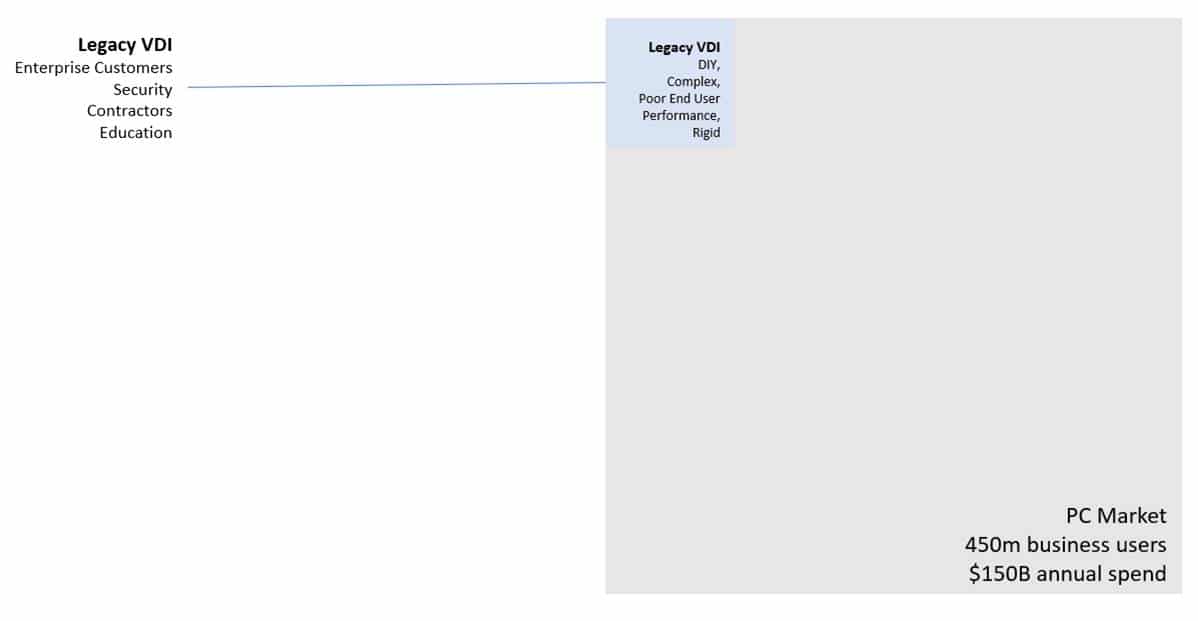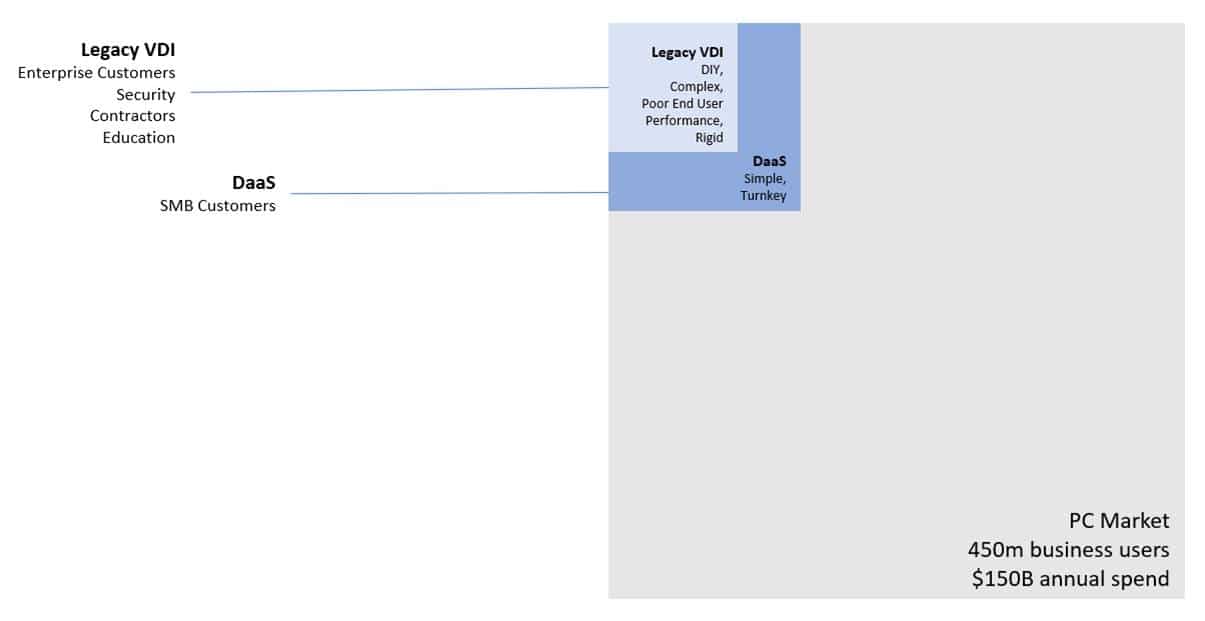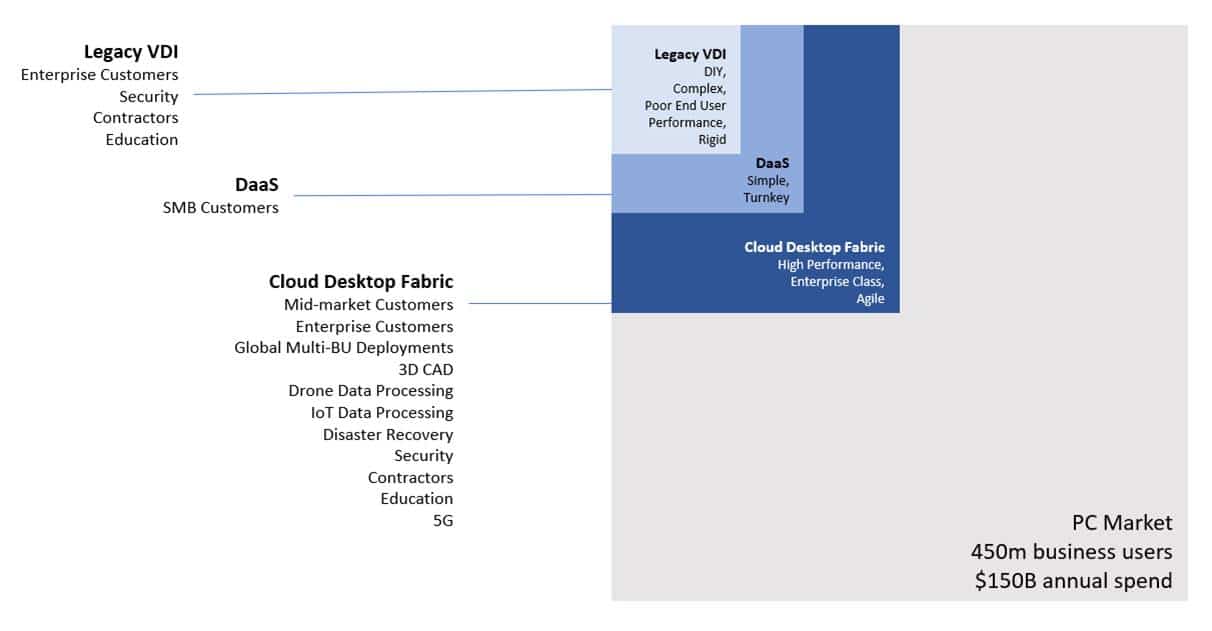“This is the year of VDI” – Really?
During the last decade, year in and year out, various industry insiders would proclaim it to be the “Year of the Virtual Desktop.” It never happened. VDI never became mainstream. Why? Because VDI failed to meet the needs of many use cases. For example, its poor performance for remote workers is legendary and for many use cases, that’s a complete show stopper (well, it is if you care about productivity!). We’ve heard directly from power users, such as CAD engineers, who’ve tried on-premises VDI and lost productivity. Why would you want to do that? Most organizations also discovered early on that it is too complex and too expensive to deploy and maintain, so rollouts tended to be smaller and departmental. We hear the same litany of complaints from IT leaders about legacy VDI:
- It takes months, sometimes years, to roll out production VDI
- It’s too complex and the day to day effort involved in maintaining VDI is not sustainable
- Patching and upgrading the VDI solution results in too much downtime
- Users are very unhappy about the performance of their virtual desktops
- Scaling the system is incredibly challenging; it requires new infrastructure, multiple farms, and it takes too long
These challenges have limited the kinds of use cases VDI can address. Even large companies that have substantial IT teams with advanced skills are challenged to successfully deploy legacy VDI at scale. Despite the expense and management complexity, they have forged ahead and tackled certain use cases that cannot really be solved with any other technology. For example, providing secure access to corporate resources for contractors or to students in lab environments are both common use cases that have realized some security benefits from legacy VDI. But anything having to do with high-performance computing is a non-starter. Other organizations have chosen not to deploy VDI because of its complexity, cost, and poor end-user performance.

Complexity and poor performance limits the addressable use cases for legacy VDI
Not All DaaS Solutions Address New Use Cases for Virtual Desktops
More recent VDI solutions are turnkey, cloud-based “Desktop as a Service (DaaS)” solutions, where the entire stack is delivered as a SaaS solution. These modern-day solutions are cloud-
based, multi-tenant solutions delivered by product companies that actually built the solution (as opposed to Managed Service Providers who implement a vendor’s solution). They have complete control over the toolset built to deliver and rapidly evolve the service to meet customers’ needs. It’s very easy to get started, and you don’t have to manage infrastructure.
But modern DaaS solutions come in very different flavors. For example, Amazon Workspaces is a DaaS solution that expands the size of the VDI market by making it accessible to small and medium business (SMB) customers. Low costs and turnkey service are very attractive for organizations that have limited in-house IT resources, and many small companies can get by with their one-size-fits-all approach to cloud desktops, which is the standard offering. But enterprise requirements are a different story; simplicity must go hand-in-hand with having the ability to customize cloud desktops, and a generic cloud desktop can’t support complex enterprise use cases.
Other Daas solutions still require highly specialized in-house IT personnel to perform the work required to support custom images, custom tools, and custom authentication. Very often these solutions don’t even run Windows 10 – there are limitations to running Windows 10 on shared infrastructure for most companies. Workspot can also be placed in the “DaaS'” category, but we have invented a whole new approach that expands the market even further.

DaaS solutions are particularly appealing to SMB, but most don’t address enterprise use cases well
The Cloud Desktop Fabric Helps Customers Innovate
Some of the more recent DaaS solutions just took their existing single data center architectures and implemented them as a multi-tenant stack in the cloud. When we look at business automation SaaS software, that approach was sufficient to get started. However, when we’re talking about virtual desktops, hosting the old architecture in the cloud doesn’t take you where you need to go – it can’t. For virtual desktops, the true power of the cloud comes from being able to deploy cloud desktops across the dozens of cloud regions each public cloud vendor offers – in minutes – and then manage everything from a single pane of glass. it’s that power that results in massive business agility benefits. Legacy VDI and most DaaS solutions cannot achieve this global scalability, and therefore, they limit business agility. That’s why we invented a new architecture. With Workspot’s Cloud Desktop Fabric™, exciting new use cases for virtual desktops are driving innovation and competitive advantage for our customers. For example, Workspot cloud workstations are completely transforming the architecture, engineering, and construction (AEC) industry by enabling real-time collaboration on complex 3D models and processing complex images, such as from drones, in a fraction of the time it took previously. In life sciences, accelerating product lifecycles in this way can be life-saving, and in a natural disaster, you’ll want a Workspot customer analyzing drone data to accelerate rescue operations. Similarly, when an organization experiences a business continuity disruption, standby cloud desktops and workstations can be activated with a single click, enabling users to get back to productivity as soon as they are ready – possibly saving the entire business. These are just a few new use cases that now derive significant benefits from virtual desktops – when you choose the right cloud desktop architecture. That’s where Workspot’s Cloud Desktop Fabric comes in.
Workspot created The Cloud Desktop Fabric as a cloud-native, multi-tenant, turnkey, SaaS solution, which enables a slew of new capabilities that allow these complex, new use cases (and many more!) to be successfully addressed. Now, organizations of all sizes can reap the business agility benefits of virtual desktops that have been so elusive.
- Cloud desktops can be deployed in days or weeks rather than months or years
- Our turnkey cloud desktop service eliminates VDI infrastructure and simplifies IT
- Upgrades happen automatically without downtime
- Unmatched performance even CAD engineers love
- Add cloud desktops anywhere in the world in minutes

The Public Cloud and Workspot’s Cloud Desktop Fabric are Addressing Exciting New Use Cases
Notably, by locating a cloud desktop in the region closest to the end-user, we can virtually eliminate latency and deliver an astonishing PC-like performance – even for GPU instances. No other vendor has cleared this important hurdle.
Want to explore some of the new use cases for virtual desktops and how cloud desktops fit into your organization? You can schedule a brief meeting online and we’ll show you how it works.




